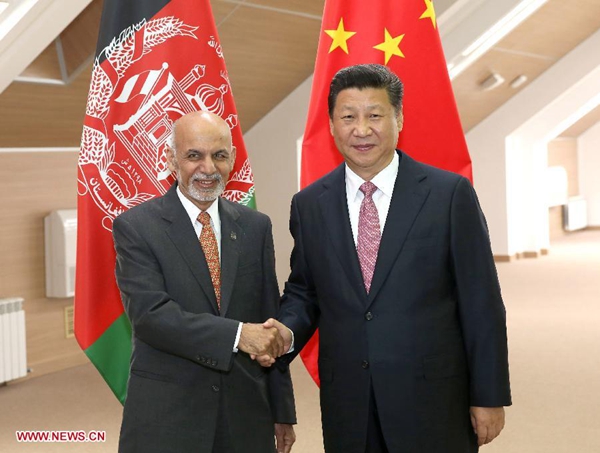Moscow talks on Afghanistan are a missed opportunity for Washington
china.org.cn / chinagate.cn by Arif Rafiq, April 13, 2017 Adjust font size:
|
|
|
Chinese President Xi Jinping (R) shakes hands with his Afghan counterpart Ashraf Ghani in Ufa, Russia, July 10, 2015. (Xinhua/Pang Xinglei) |
This April, Russia will host five regional states - Afghanistan, China, India, Iran, and Pakistan - to discuss peace and reconciliation in Afghanistan. The Afghan Taliban are also reportedly interested in attending, should they receive an invitation. Absent from the talks will be the United States. Non-participation is to the detriment of Washington when a negotiated settlement is the only way to bring the unwinnable war in Afghanistan to an end.
Though the Afghan government remains in control of the capital, Kabul, elsewhere in the country the situation is quite dire. The Taliban control or contest nearly half of the country's districts, including most of those in the south, and many areas near the Ring Road highway that links Afghanistan's major cities. This year's formal fighting season is set to begin, but even during the winter, the Taliban made significant advances, suggesting that the fighting this summer will be intense and perhaps even decisive in shaping the future of the stalemated war.
The Trump administration is looking for a way to "win" in Afghanistan. But it must know that there will be no victory there. A clear or even cosmetic victory is impossible given the deficiencies of the Afghan state. Creating an Afghan administration, military, and police that is capable of clearing, holding, and building in insurgent-held territory would take a decade or more, and tens of billions of dollars Washington is unwilling to spend. Additionally, it would require rooting out corruption and recruiting more capable personnel. Presently, most Afghan security personnel are illiterate and a high number are drug abusers. Recently, an Afghan National Army commander was arrested for stealing funds intended for feeding his soldiers. The province in which he served, Helmand, is now almost entirely controlled by the Taliban. The Afghans deserve the support of the international community, but no foreign power can convince a people to fight their own country.
The natural inclination of the Trump Administration will be to raise troop levels in Afghanistan and ease the rules of engagement, enabling more liberal use of air power. This may stymie the Taliban's advance for a short period, but also risks increasing civilian casualties, as we have seen recently in Iraq and Syria, and to some extent in Afghanistan last year. In other words, the greater use of force is no panacea-it carries its own risks and may even do more harm than good.
The Quadrilateral Coordination Group involving Beijing, Islamabad, Kabul and Washington was an admirable multilateral effort to bring the Taliban to the negotiation table. It reflected U.S. pragmatism and a willingness to cooperate with China in forging a mutually desired political settlement in Afghanistan. In July 2015, Afghan government officials and representatives of the Taliban insurgency were on the verge of holding a second round of talks in Pakistan when news of Mullah Omar's death was leaked, suspending the peace process. The dialogue was brought to an end the next year with the U.S. killing of the Taliban leader Mullah Akhtar Mansour in May 2016.
President Barack Obama described Mansour's assassination as an "important milestone" in the efforts to bring peace to Afghanistan. In reality, it set back the peace process by at least a year and gave Mansour's successor little choice but to escalate the Taliban offensive in order to consolidate his control over the group.
As the Trump administration develops its own Afghanistan policy, regional states like Russia have stepped in to fill the void. Washington must avoid the reflexive urge to see Moscow's efforts as motivated by a mere desire to cause trouble for it. Regional states have far more to lose from an anarchic civil war in Afghanistan. Instead, Washington should see the April gathering for what it truly is: a vote of no confidence by regional states in America's war in Afghanistan.
There are a number of multilateral forums through which various power brokers discuss and coordinate Afghanistan policy. But the most important players are the Afghans themselves. No foreign power can impose a solution on Afghanistan. But it is important that foreign powers band together to prevent a re-emergence of a 1990s-style situation, in which two blocs of regional states supported opposing sides in the Afghan civil war.
It remains to be seen whether the Moscow talks can revive the reconciliation process in Afghanistan. But if they do produce a regional consensus, Moscow ought to give Washington another chance and make the sensible choice of revisiting its stance on participation in future rounds.
Arif Rafiq is president of Vizier Consulting, LLC, which provides strategic guidance on Middle East and South Asian political and security issues. He is also a fellow at the Center for Global Policy and a non-resident fellow at the Middle East Institute.
Opinion articles reflect the views of their authors, not necessarily those of China.org.cn.
